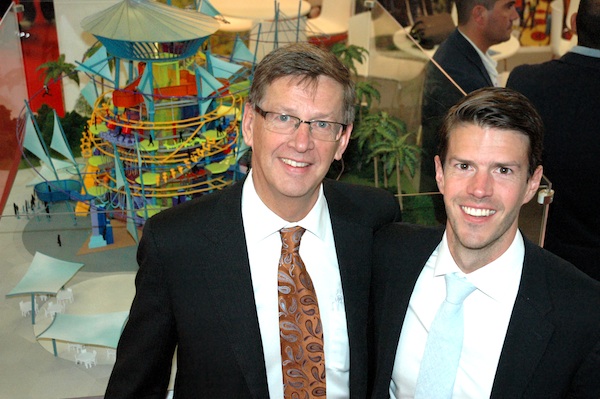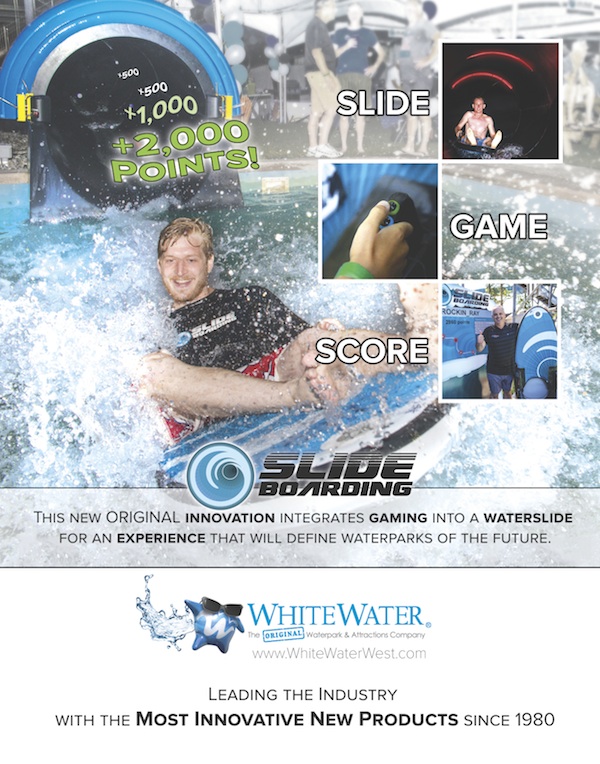Geoff and Paul Chutter join forces
Since its founding in 1980, WhiteWater West Industries Ltd. has grown into a leading supplier in waterparks and attractions that “thinks outside the pool.” In September, WhiteWater announced the appointment of founder and CEO Geoff Chutter’s son, Paul Chutter, as Vice President, Sales Operations/Corporate Development. InPark editor in chief Martin Palicki interviewed the father-son business duo about company history, their individual backgrounds and the new dynamic this alliance brings to WhiteWater.
Let’s start at the beginning. Geoff, you’ve said that you saw an opportunity in this business after viewing Canada’s first waterpark in development. Tell me about that park visit – how did you realize this was going to become such a big industry?
Geoff: In 1980, I’d been working for KPMG for 5 years as a CPA. One of my audits was with the Jimmy Pattison group. During the audit I saw the first waterslide park in Canada called Wild Waters, which was located in Kelowna, BC. I was so intrigued by it and started looking for land. On December 15, 1980 a partner and I bought 18 acres of land in the Okanagan valley and built WhiteWater, the waterslide park.
Honestly, I had no idea that the industry would grow as it has and in fact the entire start was building and operating our own waterpark. The vision of doing what we do today, came later.
Geoff, what was your original plan for the company? To become an operator? Supplier? Both?
Geoff: The initial plan was solely park ownership and operations. However, after opening that park, four different groups approached me wanting information on how to design and manufacture waterslides. We had manufactured our own waterslide molds, so we entered into contracts to supply waterslides to these groups, and the rest is history. I discovered that I enjoyed the development more than operations. The first waterslide I ever rode was testing our own when we opened the waterpark.
Paul, you grew up the same time WhiteWater did. What are some of your memories of being raised in a leisure environment?
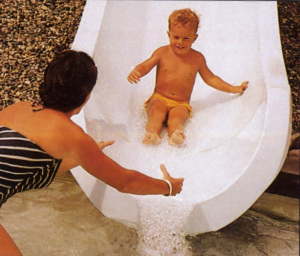
Paul: I have very fond memories of growing up alongside an industry that was equally as young and undeveloped as I. After-hours evenings spent riding slides as a toddler right through to lengthy stays in Europe and Asia during park constructions all formed part of a childhood intimately linked to this industry from the beginning. Today it is incredibly gratifying to look back at both of our evolutions.
Geoff, back in 1980 what background did you bring to launch this new business?
Geoff: When I opened up my first waterpark, I had no experience launching businesses. As a CPA I had worked with dozens of companies, from a financial perspective of course, but also got to talk to management teams and learn about their daily challenges and accomplishments of having a business. Also, my father, uncles, and my grandfather all did very well in business. I came from a family of entrepreneurs – so to a degree it was in my blood. Having them support me emotionally has been huge to WhiteWater’s success.
Tell us about some of those family businesses over the generations.
Geoff: On my Dad’s side of the family, my grandfather emigrated from the UK and ended up bringing to Vancouver with him a wire rope manufacturing business. With mining and forestry industries booming in BC, wire rope was in great demand and was up to that time imported, until my grandfather built a factory in what is today the Granville Island Market. He managed the factory until retirement, when my uncle took over.
My father and uncles also owned their own businesses, each with success. My father’s first 20 working years were as a professional engineer at Lafarge Cement in both France and Canada. I credit him for WhiteWater’s early entrance into the international market, having spent my high school years in Paris.
Paul, did you think that someday you wanted to work for the company?
Paul: It was always something that was in the back of my mind, yes. But for me it was incredibly important to forge my own path, to develop my own career prior to even contemplating joining the WhiteWater family. This was paramount not just for my own principled reasons, but critically, so that there was legitimate value I brought to the business when I joined.
Paul, tell us a bit about your professional career path and what inspired you to go in that direction.
Paul: After graduating from McGill University, I had great ambitions of living and working in one of the world’s true commercial centers, and therefore took the step of moving to London where I attended law school. Years of living in a global financial hub drew my attention to the fast-paced world of investment banking, where upon completion of my studies, I began working first in corporate finance and M&A advisory, then in equity sales and trading, where I spent years working intimately with many of Canada’s largest corporations. I can’t think of any better foundational experience to then be applied to business operations.
Tell us about your new role at WhiteWater, Paul, and what you are bringing to the company.
Paul: I have joined as WhiteWater’s Vice President of Sales Operations & Corporate Development. Our team sits at the heart of our sales, design, engineering and estimating groups, coordinating the entire life cycle of a contract, from incubation to completion. Additionally, I personally will be assessing and evaluating any corporate development opportunities in our marketplace that may be accretive to WhiteWater. I hope to be able to incorporate my experience analyzing businesses in the public sphere to bring a distinct and objective mindset to WhiteWater. A fresh set of eyes and a new perspective can often be as valuable as all of the industry experience in the world.
Geoff, what are your thoughts on Paul working now for WhiteWater?
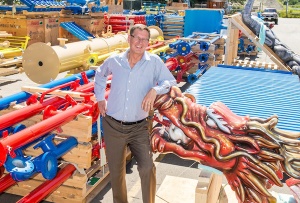
Geoff: I was caught completely off guard when Paul expressed interest in working for WhiteWater because for 32 years Paul and I have never, ever talked about him working here. It was just this past spring when I was out in Toronto for a board meeting that Paul told me of his interest in moving from the financial sector, working as the Director of the Canadian Desk for UBS Europe, into the manufacturing sector.
I then discussed the idea of Paul working for WhiteWater with many people and received overwhelmingly positive attitudes towards it. I give Paul tremendous credit for going out into the real world and working hard and proving himself before joining WhiteWater. His number one motivation for coming to WhiteWater was simply to work for his Dad, which frankly leaves me speechless and full of emotion.
How is the family dynamic now that you are working together?
Paul: My father and I have always had a great personal and now, working, relationship. We have each individually and independently acted as sounding boards for the other on various topics and at a variety of stages in our lives. This new chapter represents yet another iteration of that very meaningful and ever developing relationship.
Who has inspired you?
Paul: In the business world, Richard Branson, for his passion, entrepreneurial spirit, sense of adventure and dedication to conservation; and Warren Buffet, for his foresight, his unprecedented benevolence, and his unrivaled understanding of business fundamentals. In life, my father, for all that he has taught me.
Geoff: My father, uncles and grandfather have inspired me in the business side of life. All were very successful and they operated within the basic principles of integrity, fairness and hard work. I have also been inspired by the books “Good to Great” and “The Toyota Way.”
What sort of innovations, products or parks are you most proud of?
Geoff: An innovative acrylic Master Blaster that was installed on a cruise ship was an engineering feat that I’m extremely proud of, but the product that resonates with me personally and is consistently the number one ride in every park, is the Boomerango. The combination of sensations guests experience is unparalleled and has led to our introduction of Fusion waterslides which are slides with two or more iconic feartures.
The more recent innovation we’re excited about is Slideboarding, which we believe will be a game changer in both the waterpark and the amusement park industries.
What role does innovation play in the waterpark market, and at WhiteWater?
Geoff: Innovation is huge for WhiteWater and within the industry. We have a significant budget devoted to product development and a 10-person team exclusively dedicated to the development of new products and the constant improvement of existing ones. In the last 2 or 3 years, they have brought us great things like the Python™, the Rattler™, No Boundaries™, AquaCourse™, Raft Battle, the mobile FlowRider® and the Anaconda™. As a result WhiteWater holds over 125 patents and has received upwards of 100 prestigious awards including IAAPA Best New Product Awards, the WWA Leading Edge Awards, Amusement Today Golden Ticket Awards and more.
WhiteWater has been around for almost 35 years – what do the next 35 hold? What do you think the waterparks of 2050 will look like?
Geoff: December 2014 will mark the 35th anniversary for WhiteWater, but I think it’s the next 35 years that will be the most exciting. There is a whole new generation of new young and inspired people who are excited to take the company to the next level. There is huge opportunity to evolve the industry in terms of technology, globalization and in terms of changing the basic definition of a waterpark. We think the next 35 years will define a waterpark quite differently that what they have been known as in the past 35 years. Technology will be a big part of the waterpark industry’s future. We see lots of opportunity for change.
Is there anything you would change if you could do it all over again?
Geoff: I’ve made hundreds of decisions, and many that I’m sure I’d change if I had to do them all over again. They’ve all contributed to a greater body of knowledge that, in the long run, has resulted in a greater number of good decisions over the bad ones.
What is something you have learned that you didn’t know when starting the company?
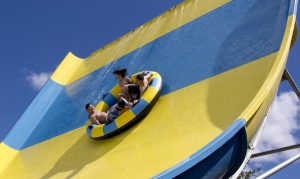
Photo courtesy WhiteWater West.
Geoff: It’s fair to say that every day I learn something new. If there is one learning moment that stands out for the company – for me – it was recognizing that the company is better served if I surround myself with people who are better than I am at what they do. WhiteWater has been incredibly fortunate to attract folks who are top caliber from around the world.
What principles do you think are important for running any successful business?
Paul: Fundamentally, businesses must be run to be sustainable – that is, to be dynamic and able to thrive through all economic conditions, in multiple markets, providing meaningful, highly differentiated results to their customers. Such differentiation is key to survival. Equally important is respect for your employees. The best businesses provide a work environment where each employee feels the organization and their leadership respects their dignity and the value of their contributions to the business. Lastly is a drive to be a leader in your space. If you are not disrupting things and creating new value for your customers, what are you doing today?
Geoff: WhiteWater has developed a set of fundamental principles that guide the running of the company. In the end, it really comes down to honesty, integrity, respect and hard work. When these are blanketed over the three axioms of “Good to Great”: economic viability, passion and the ability to be best in the world, great things can occur.
Globally, what have you discovered about investing in waterpark creation and bringing your products to international markets?
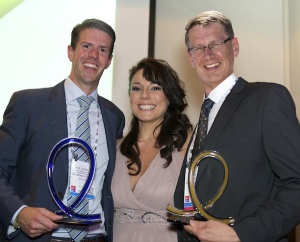
Geoff: WhiteWater has been able to defy cultural assumptions all over the world bringing waterpark success stories to places we were told we would fail. There hasn’t yet been a group of people that haven’t found the joy in the combination of water, sun and the family. Waterparks provide a place and activities where all members of the family of any age group, can have fun.
Theme parks generally make significant capital re-investments every 2-3 years to bring in a new attraction, ride or show. What should the reinvestment strategy be for waterparks?
Geoff: Similar to the theme park industry, waterparks can become stale and there should be an ongoing program of introducing a new attraction every 2-3 years to keep people coming back. Being a new industry, we haven’t faced a shortage of brand new products that push the boundaries. We were fortunate in 1980 in that we weren’t coming into a mature industry. As the ‘Original Waterpark Company’ the last 35 years have generated no shortage of new ideas. Our own reinvestment strategy, not surprisingly, has been to attract the next generation of stars to lead not only WhiteWater but also the industry. • • •


